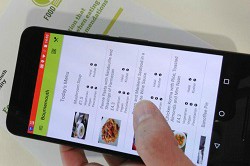New mobile app for healthier food choices when dining out
Over the last few years, the frequency of dining at restaurants or other out-of-home dining establishments in Europe has radically increased. Yet, compared to meals prepared at home, restaurant fare tends to contain more calories, total fat, saturated fat and sodium. Eating out is often cited as the primary reason for an unhealthy lifestyle and increased obesity levels as consumers have very little knowledge regarding the nutrient profile of the food. Technology can greatly help consumers make smart nutritional choices based on their personal preferences. Therefore, a pan-European partnership between industry and academia developed the FoodSMART (Shaping Smarter Consumer Behaviour and Food Choice) project. The project has created an app that makes it easier for consumers to access more information about their food, thereby responding to the increasing demand for full transparency on the ingredients and health implications of the food served outside home. FoodSMART is a four-year project with researchers from Austria, Denmark, France, Greece and the UK. Choosing the right food New EU regulations require the clear labelling of allergen presence for food served by hotels, restaurants and catering owners. “It could be easily argued that it is a fundamental right for people to know what they are eating,” says project coordinator Professor Heather Hartwell. FoodSMART’s new mobile application is designed to provide food service providers and consumers with a range of food-related information. For example, it informs consumers about the nutritional value, presence of possible allergens, food provenance and carbon footprint of each meal. The newly developed app is a helpful tool for users wishing to consume foods which align with their particular dietary preferences and restrictions. “Just by using GPS location, the app identifies the nearest canteen or restaurant and then takes users through a range of options that they can personalise and adjust to suit their own diet. A menu of available dishes is then displayed, and by clicking on them, consumers can find out additional information like nutritional content and the origin of ingredients,” further explains Prof. Hartwell. What’s more, the app offers the possibility of printing Quick Response (QR) codes on menus so that consumers can scan them with their phones to access the menu and all the additional information. Reducing obesity levels Any initiative encouraging consumers to eat more ‘attentively’ could help reduce calorie intake. In Western Europe, obesity has risen by 15 % over the last 10 years, and this has been associated with dining out on a frequent basis. “Research has shown that a third of British consumers underestimate how many calories they are eating each day. Public health officials in the UK are now recommending food operators and manufacturers reduce portion size and cut calories in their products by 20 % by 2024,” says Prof. Hartwell. All this data shows the need to make a radical change on the level of information provided about the food served outside the home. As part of its mission to reduce obesity levels, this innovative project should empower people to make informed food choices, helping them overcome challenges like a lack of clear labelling on dishes and improper calculation of the nutritional content on menu items. FoodSMART constitutes a ground-breaking effort to provide diners with enhanced meal information when eating out. The project has just completed the phase of testing its app and is now in the process of making it available on the market. Reports indicate that this mobile app can give a competitive advantage because it considers workers’ health, provides accurate data on the dish consumed and does not include advertisements.
Keywords
FoodSMART, mobile app, obesity, calories, personalised nutritional choices, allergens







